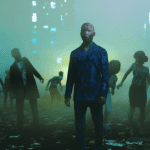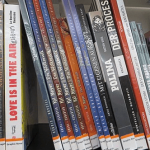 History
History  History
History  Weird Stuff
Weird Stuff 10 Wacky Conspiracy Theories You Will Need to Sit Down For
 Movies and TV
Movies and TV 10 Weird Ways That TV Shows Were Censored
 Our World
Our World 10 Places with Geological Features That Shouldn’t Exist
 Crime
Crime 10 Dark Details of the “Bodies in the Barrels” Murders
 Animals
Animals The Animal Kingdom’s 10 Greatest Dance Moves
 Movies and TV
Movies and TV 10 Box Office Bombs That We Should Have Predicted in 2025
 History
History 10 Extreme Laws That Tried to Engineer Society
 History
History 10 “Modern” Problems with Surprising Historical Analogs
 Health
Health 10 Everyday Activities That Secretly Alter Consciousness
 History
History 10 Dirty Government Secrets Revealed by Declassified Files
 Weird Stuff
Weird Stuff 10 Wacky Conspiracy Theories You Will Need to Sit Down For
 Movies and TV
Movies and TV 10 Weird Ways That TV Shows Were Censored
Who's Behind Listverse?

Jamie Frater
Head Editor
Jamie founded Listverse due to an insatiable desire to share fascinating, obscure, and bizarre facts. He has been a guest speaker on numerous national radio and television stations and is a five time published author.
More About Us Our World
Our World 10 Places with Geological Features That Shouldn’t Exist
 Crime
Crime 10 Dark Details of the “Bodies in the Barrels” Murders
 Animals
Animals The Animal Kingdom’s 10 Greatest Dance Moves
 Movies and TV
Movies and TV 10 Box Office Bombs That We Should Have Predicted in 2025
 History
History 10 Extreme Laws That Tried to Engineer Society
 History
History 10 “Modern” Problems with Surprising Historical Analogs
 Health
Health 10 Everyday Activities That Secretly Alter Consciousness
Top 10 Historical Fiction Novels That Entertain and Educate
Reading books is a great way to learn new things, but when we think of educational literature, the image that most commonly springs to mind is that of dusty old textbooks. Reading for educational value doesn’t have to be boring, however. There’s an entire genre dedicated to fictional stories set in real historical locations, often with historical figures appearing.
These stories, if done properly, can be both immensely entertaining and unexpectedly enlightening as the reader is plunged back in time and given the chance to experience people and places as they once were long ago. This list aims to highlight the best historical fiction novels—those that will grip you from the first page and leave you more knowledgeable by the end.
Related: Top 10 Most Confusing American Novels
10 The Given Day–Dennis Lehane (2008)
Boston native Dennis Lehane is known for writing detective stories set in his home city, some of which like Gone Baby Gone and Mystic River, have gone on to become hit films. In The Given Day, Lehane tries something a little different, changing not the place but the time of the novel, taking us back to Boston just after the First World War—a turbulent, seldom explored slice of history.
The story is told from the perspective of a family of Irish-American policemen as they navigate the troubled world of Boston in 1919. Real historical events, like the influenza epidemic, racial tensions, political maneuvering by the city’s government, the growing fear of socialism, and the infamous Boston police strike form the backdrop of this thoroughly enjoyable story. Some real historical figures make brief appearances. Lehane’s work is always highly readable, and The Given Day holds a lot of educational value as well.[1]
9 Black Cross–Greg Iles (1995)
The Second World War makes for a great setting for historical fiction. We know the outcome of the conflict, but many mysteries remain as to why, exactly, things turned out the way they did. One such mystery is why Hitler didn’t resort to chemical warfare, despite the Nazis inventing the deadly nerve agent sarin. Its use would have killed millions if released on the battlefield and changed the course of history as we know it. This is the subject matter deftly explored by Greg Iles in Black Cross.
The story weaves an intriguing blend of fact and fiction into a stunning narrative tapestry that grabs hold of the reader early on and doesn’t let go until the end, as scientist and pacifist Mark McConnell and Zionist terrorist Jonas Stern embark on a secret mission behind enemy lines to dissuade the Nazis from deploying their ample stocks of sarin. Iles expertly toys with the reader, as the events of the story might not have happened, but they could have, leaving one with a very plausible explanation for at least one of history’s many mysteries.[2]
8 Wolf Hall–Hilary Mantel (2009)
History has left many with preconceived notions of right and wrong, good and evil, and heroes and villains. Most people familiar with 16th-century England think of Thomas Cromwell, chief minister to Henry VIII, as one of the bad guys of the time. He’s credited with orchestrating Thomas More’s execution, dissolving the monasteries, and engineering the king’s fateful union with Anne Boleyn. Yet, in her award-winning 2009 novel Wolf Hall, Hilary Mantel throws this conception out the window, painting Cromwell as one of history’s unlikely heroes.
The author handles this tricky task expertly, delving into Cromwell’s troubled childhood and his deep love for his family and faith, giving the man a very human side we can all relate to. Mantel’s exhaustive research of the period provides the story with a high degree of historical accuracy, detailing the thrilling events that made Henry VIII one of the time’s most famous monarchs. Readers who enjoy the tale (which will be most, if not all) will be thrilled to learn that Wolf Hall is the first part of a trilogy, and the books that follow are just as good.[3]
7 Spartacus: The Gladiator–Ben Kane (2012)
Most will be familiar with the name Spartacus, the Thracian gladiator who brought the mighty Roman Republic to its knees in the Third Servile War (73–71 BC). The legendary figure inspired the likes of Karl Marx and Che Guevara and has been immortalized on screen. These cinematic representations tend to make liberal use of creative license since very little was written about Spartacus in historical records. Fortunately, Ben Kane, something of an expert in all things ancient Rome, sticks as close to the historical record as possible in Spartacus: The Gladiator.
Kane details the gladiator’s time as a slave, his escape, and the remarkable events that followed as Spartacus raised an army and defeated not just entire legions but consular armies as well. For details that have been lost to history, like the Thracian’s time before captivity and certain parts of his epic campaign, the author recreates what might have happened in a thrilling tale in this first novel of a two-part series.[4]
6 Company of Liars–Karen Maitland (2008)
Karen Maitland is an expert when it comes to writing gripping historical fiction, and Company of Liars is one of her best-loved novels. Set in England in 1347, the Black Death has seized the population with panic. It’s against this backdrop that nine individuals band together to outrun the plague, but no one is quite who they seem to be. Each has a story to tell, and with each revelation, the plot thickens.
The author captures the feeling of the period perfectly—the story is hauntingly atmospheric and full of intrigue. The focus here is not on historical detail but rather on the characters and the chilling narrative that contains horror elements and ends with a twist that leaves readers stunned and desperate for more. Company of Liars is historical fiction at its finest and should not be missed by fans of the genre.[5]
5 Birdsong–Sebastian Faulks (1993)
War is hell. This is something everyone knows, and it’s brought home powerfully in Sebastian Faulks’ World War I novel Birdsong. Much less publicized than later conflicts, the First World War had no shortage of carnage and bloodshed. Faulks brings this dark part of our history to life with his almost detached description of death and destruction, giving the reader the sense that death is commonplace and could be visited on any character at any time.
The story doesn’t deal solely with loss and tragedy, however. Interspersed between the scenes of gore, we are given a poignant look at soldiers’ domestic lives, and the central theme of the novel is the lead character, Stephen Wraysford’s secret love affair with Isabelle. Dripping with atmosphere, the read is, in turn, gripping, exhilarating, and heartbreaking, transporting the audience back to the bloody trenches at the Somme and the tunnels men risked their lives for.[6]
4 The Alice Network–Kate Quinn (2017)
Kate Quinn is another author who specializes in historical fiction, and her excellent stories are thoroughly researched and stick close to recorded facts. The Alice Network is based heavily on a true story about a group of female spies operating in occupied France during the First World War. The book begins with a time jump to 1947, where it tale centers on Charlie St. Clair, an American socialite who travels to France to search for her cousin who disappeared during the Nazi occupation.
Along the way, Charlie encounters Eve Gardiner, who joins the quest and, along the way, reveals her part as a spy in WWI, part of the historical Alice Network. Spanning two wars, switching seamlessly between past and present, and mesmerizing the reader along the way, Quinn stamps her authority on the genre in this excellent story. No one-hit wonder, the author has since written three additional novels in a similar vein, securing her place firmly on this list.[7]
3 The Terror–Dan Simmons (2007)
Known for refusing to be pigeonholed into a single genre, Dan Simmons has written an impressive array of novels, from science fiction to crime and horror. In an unusual move, The Terror combines historical fact with sheer, heart-pounding horror. In his signature way, Simmons pulls off this ambitious project commendably.
Franklin’s fateful voyage to find the Northwest Passage in 1845 ended tragically when both vessels, The Terror and The Erebus, became trapped in the polar ice, and the crews were forced to abandon ships. We don’t know what became of them, and here Simmons comes into his own, weaving a chilling tale of evil, both human and otherworldly.
Each chapter is told from the perspective of one of several key characters, some of whom were real historical figures on the expedition, which serves to immerse the reader thoroughly in the narrative. The tale is long, packs a punch on every page, and is scary as hell to boot.[8]
2 Fall of Giants–Ken Follett (2010)
The first installment of The Century Trilogy, Fall of Giants is a true masterpiece by one of the greatest historical fiction authors in the world, Ken Follett. Rather than taking a story idea and basing it in a historical setting, Follett takes historical fact and blends it expertly with a fictional tale in which the characters experience, influence, and are defined by real-world events.
Fall of Giants details the build-up to World War One, the conflict itself, and the years that followed in painstaking detail. The author’s research is so comprehensive, and the facts so faithfully reproduced that the novel could easily be used as a textbook for this definitive period in history. The difference is this is no boring slog through endless pages, but a breathtaking tale brought colorfully to life by one of the best in the business.[9]
1 New York–Edward Rutherfurd (2009)
New York, Edward Rutherfurd’s epic historical fiction novel, isn’t a story of people but one of a place—the city after which the book takes its name. Sure, there are characters, generations of them, but the tale is about the essence of a great city as it’s built and shaped by world events.
Starting in the 17th century, when Manhattan was a Dutch colony, and finishing with the 9/11 terror attacks, the story covers the Revolution, the Civil War, the Industrial Revolution, the Depression, and many other real events that shaped the development of the vibrant city.
Each new generation of characters is colorfully represented against the historical backdrop, and Rutherfurd litters countless little-known facts about both time and place throughout. New York is breathtaking in both span and depth and is undoubtedly the perfect historical fiction novel for both educational and entertainment value.[10]








